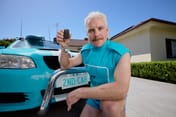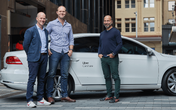
How to Explain Peer-to-Peer Car Share To Your Friends
Here's a common scenario: you're at a BBQ, and you're trying to explain the concept of people renting out their cars to strangers via the Interwebs. There's a bit of head-nodding; then a "That's so cool!" or "That's totally insane!" - and then the questions start.
If we had a dollar for every time someone asked: "But what about insurance?" in these situations, we'd have plenty of dollars by now. And since people often tell us that they struggle to come up with clear and simple answers to these common questions, we thought we'd put together a quick cheat-cheat.
Bookmark this page, and whip it out whenever you're at a loss for words!
Your cheat sheet: simple answers to the ten most common questions about peer-to-peer car share
Q: How does the insurance work?
A: All bookings include damage and loss cover for the borrower. You can keep your own insurance to cover your car at other times.
Q: What happens if someone borrows my car and damages it?
A: If your car needs repairs, Uber Carshare arranges for the car to be taken to the repairer, fixed and brought
home. The Borrower pays for the repairs. You get $25 a day while it’s at the mechanic’s, so you can rent someone else’s car.
Q: I’ve seen how people treat rental cars. Won’t they just thrash my car?
A: Borrowers are actually really careful: firstly because they know they’re borrowing the car from a real person rather than a big rental company; and secondly because they know they’ll get kicked off the platform if they don’t follow the rules. The cars are also fitted with a device that monitors driving behaviour.
Q: How do people get the car keys?
A: You put your spare key in a secure electronic Lockbox that either sits on a bracket that slides over the rear window, or is attached to a fence or wall near your house. The borrower gets sent a PIN at the start of their booking that lets them open it and get the key.
Q: Who pays for fuel? Will I be paying for the costs of people driving my car?
A: You pay for all of the fuel that goes through the vehicle. If the Borrower needs to refuel, they fill up and the charge will passed on to you. But you get paid for each kilometre that Borrowers drive, to cover you for both the fuel that Borrowers use, and the wear and tear from that driving.
Q: What if someone gets a fine while they’re driving my car?
A: Uber Carshare’s reservation system keeps track of who has the car at any time, so they can easily match the fine to the responsible person. The Borrower pays directly, and if they don’t, Uber Carshare helps you to transfer the fine into their name.
Q: Is it a hassle to deal with the admin of people borrowing your car?
A: It’s all managed online, so there isn’t much for car owners to do. You just need to block out your car for the times when you want to use it yourself. You don’t need to confirm bookings or meet borrowers, and all of the payments are processed automatically so that you just get paid at the end of the month. Most people spend less than an hour a month managing their car.
Q: Can you actually make any money?
A: The average car owner earns about $2000 a year, but popular cars, vans and utes earn $7,000 a year or more.
Q: Won’t the extra driving depreciate my car and cancel out any money I earn?
A: The extra driving from borrowers doesn’t actually add that much to the odometer, as most trips are in the local area. For people who don’t drive much themselves anyway, the extra driving just gets you back up to the average, and doesn’t have an impact on the price you’ll get if you want to resell your car.
Q: Is it like Uber?
A: Not really. With Uber, you get someone to drive you around in their car. With peer-to-peer car share, you get to drive someone's car when they're not using it.
Where to find answers to even more common questions about peer-to-peer car share
Occasionally, you'll encounter someone who comes up with a heap of curly what-ifs and how-abouts. (Hello, uncle Mike!)
The best thing to do is to point them in the direction of our FAQs, where they'll find the answers to pretty much every question we've been asked more than once.








